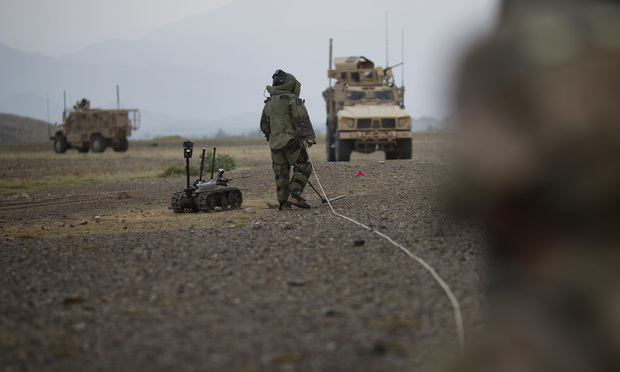Litigating from the Battlefield
Recovering PI Claims Against Iran for Servicemember Wartime Injuries
September 03, 2019 at 01:00 AM
5 minute read
 Soldiers watch an explosives disposal technician and he disables an IED as they conduct a patrol to the west of their base at COP Sabari
Soldiers watch an explosives disposal technician and he disables an IED as they conduct a patrol to the west of their base at COP Sabari
As many military servicemembers would tell you, "Explosively Formed Penetrators" ("EFP") were among the most lethal technologies deployed by our enemies during Operation Iraqi Freedom. EFP's are a type of Improvised Explosive Device consisting of a concave-shaped copper bowl, sitting on top of a metal tube that is packed with explosives. Iraqi insurgent forces—operating with the support and assistance of the Islamic Republic of Iran—would disguise these EFP devices and place them alongside a well-traveled road. Insurgents would then remotely detonate the explosive device at a passing military convoy. Immediately upon explosion, the concave copper plate would deform into bullet-like projectile that would pierce through multiple layers of armor like a warm knife through butter. The results were devastating.
The influence of Iran in developing and deploying the EFP technology has given rise to hundreds of lawsuits filed in U.S. Federal Courts, whereby injured service-members are seeking recovery against Iran for their wartime injuries. To recover, the injured servicemembers rely on 28 U.S.C. § 1605A, which states:
A foreign state shall not be immune … [from a lawsuit] in which money damages are sought against a foreign state for personal injury or death that was caused by an act of torture, extrajudicial killing, aircraft sabotage, hostage taking, or the provision of material support or resources for such an act if such act … is engaged in by an official, employee, or agent of such foreign state while acting within the scope of his or her office, employment, or agency.
The U.S. servicemembers bringing these lawsuits point to numerous organizations such as Kata'ib Hezbollah or the Mhadi Militia—both which were organizations that actively conducted attacks in Iraq, and both which are controlled and/or supported by Iran.
Iran refuses to recognize the legitimacy of U.S. law, therefore most of these personal injury and wrongful death lawsuits are disposed of through default judgments. As one might expect, collection efforts have proven near impossible. Nevertheless, the servicemembers can recover monetary damages from the "United States Victims of State Sponsored Terrorism Fund" (34 U.S.C. § 20144), which is a multi-billion-dollar fund comprised of monies from fines, sanctions, and penalties against entities who may have violated sanctions against Iran.
Against this backdrop and precedence, an interesting legal question arises: what individual recourse would military servicemembers have if the United States initiates military action directly against the Islamic Republic of Iran? Recent events—including Iran's attack on a $220 million U.S. drone—have pushed these two countries to the brink of war. The Commander-in-Chief has even stated that he was "cocked and loaded" to strike Iran as noted in the New York Times, and that America's response "will soon be increased, substantially" as quoted in the Wall Street Journal. Could an infantryman prevail on a lawsuit for battlefield injuries sustained during a ground invasion?
The answer likely hinges on the interpretation of the term "extrajudicial killing" which, as used in 28 U.S.C. § 1605A, is defined as "a deliberated killing not authorized by a previous judgment pronounced by a regularly constituted court affording all the judicial guarantees which are recognized as indispensable by civilized peoples." This term, however, "does not include any such killing that, under international law, is lawfully carried out under the authority of a foreign nation." See 28 U.S.C. § 1350.
Numerous international bodies and laws have recognized the right of a nation to exercise self-defense. This principle was recognized by the International Court of Justice in the 1986 case of The Republic of Nicaragua v. The United States of America; by Chapter VII Art. 51 of the United Nations Charter ("Nothing in the present charter shall impair the inherent right of collective or individual self-defense if an armed attack occurs against a member of the United Nations…"); and implicitly by the Genevia Conventions, to which both countries are signatories. Accordingly, unlike the Iran's coordinated and financed killings in Iraq—which were extrajudicial—injuries or death that would occur during an invasion of Iran would not likely meet the requirements of 28 U.S.C. § 1605A because of the permissibility of self defense under international law. In other words, the exclusion aspect of the term "extrajudicial killing" would have been met, thus leaving a servicemembers only personal recourse to occur in the event of torture, aircraft sabotage, or hostage taking.
Such a conclusion, however, should be colored by the assumption that the hostilities between the U.S. and Iran involve uniformed, lawful combatants of each country. A different outcome is possible, even likely, if the same unlawful terrorist groups that have been operating in Iraq now become involved in an Iranian fight. Such terrorist organizations, operating by use of similar RFP-related tactics and not subject to a command structure controlled by a central state power, would more precisely reflect the terrorist organizations cited and ruled on in the Iraq litigation. The predominant question remains: at what point do the hostilities cease to reflect customary warfare under international law, and instead become "extrajudicial killings?"
Regardless of the answer, the massive EFP-related litigation resulting from Operation Iraqi Freedom was has fundamentally changed face of warfare to a fight that is first conducted on the battlefield, and later in the courtroom.
Andrew Cobos is a two-time combat veteran of Operation Iraqi Freedom. Andrew is also the founder of the Cobos Law Firm, a Houston-based firm specializing in personal injury law. For more information, visit www.cobos.law.
This content has been archived. It is available through our partners, LexisNexis® and Bloomberg Law.
To view this content, please continue to their sites.
Not a Lexis Subscriber?
Subscribe Now
Not a Bloomberg Law Subscriber?
Subscribe Now
NOT FOR REPRINT
© 2025 ALM Global, LLC, All Rights Reserved. Request academic re-use from www.copyright.com. All other uses, submit a request to [email protected]. For more information visit Asset & Logo Licensing.
You Might Like
View All
From Hospital Bed to Legal Insights: Lessons in Life, Law, and Lawyering
6 minute read

Nondisparagement Clauses in Divorce: Balancing Family Harmony and Free Speech
6 minute readTrending Stories
- 1CFPB Labor Union Files Twin Lawsuits Seeking to Prevent Agency's Closure
- 2Crypto Crime Down, Hacks Up: Lawyers Warned of 2025 Security Shake-Up
- 3Atlanta Calling: National Law Firms Flock to a ‘Hotbed for Talented Lawyers’
- 4Privacy Suit Targets Education Department Over Disclosure of Student Financial Data to DOGE
- 5Colwell Law Group Founder Has Died in Skiing Accident
Who Got The Work
J. Brugh Lower of Gibbons has entered an appearance for industrial equipment supplier Devco Corporation in a pending trademark infringement lawsuit. The suit, accusing the defendant of selling knock-off Graco products, was filed Dec. 18 in New Jersey District Court by Rivkin Radler on behalf of Graco Inc. and Graco Minnesota. The case, assigned to U.S. District Judge Zahid N. Quraishi, is 3:24-cv-11294, Graco Inc. et al v. Devco Corporation.
Who Got The Work
Rebecca Maller-Stein and Kent A. Yalowitz of Arnold & Porter Kaye Scholer have entered their appearances for Hanaco Venture Capital and its executives, Lior Prosor and David Frankel, in a pending securities lawsuit. The action, filed on Dec. 24 in New York Southern District Court by Zell, Aron & Co. on behalf of Goldeneye Advisors, accuses the defendants of negligently and fraudulently managing the plaintiff's $1 million investment. The case, assigned to U.S. District Judge Vernon S. Broderick, is 1:24-cv-09918, Goldeneye Advisors, LLC v. Hanaco Venture Capital, Ltd. et al.
Who Got The Work
Attorneys from A&O Shearman has stepped in as defense counsel for Toronto-Dominion Bank and other defendants in a pending securities class action. The suit, filed Dec. 11 in New York Southern District Court by Bleichmar Fonti & Auld, accuses the defendants of concealing the bank's 'pervasive' deficiencies in regards to its compliance with the Bank Secrecy Act and the quality of its anti-money laundering controls. The case, assigned to U.S. District Judge Arun Subramanian, is 1:24-cv-09445, Gonzalez v. The Toronto-Dominion Bank et al.
Who Got The Work
Crown Castle International, a Pennsylvania company providing shared communications infrastructure, has turned to Luke D. Wolf of Gordon Rees Scully Mansukhani to fend off a pending breach-of-contract lawsuit. The court action, filed Nov. 25 in Michigan Eastern District Court by Hooper Hathaway PC on behalf of The Town Residences LLC, accuses Crown Castle of failing to transfer approximately $30,000 in utility payments from T-Mobile in breach of a roof-top lease and assignment agreement. The case, assigned to U.S. District Judge Susan K. Declercq, is 2:24-cv-13131, The Town Residences LLC v. T-Mobile US, Inc. et al.
Who Got The Work
Wilfred P. Coronato and Daniel M. Schwartz of McCarter & English have stepped in as defense counsel to Electrolux Home Products Inc. in a pending product liability lawsuit. The court action, filed Nov. 26 in New York Eastern District Court by Poulos Lopiccolo PC and Nagel Rice LLP on behalf of David Stern, alleges that the defendant's refrigerators’ drawers and shelving repeatedly break and fall apart within months after purchase. The case, assigned to U.S. District Judge Joan M. Azrack, is 2:24-cv-08204, Stern v. Electrolux Home Products, Inc.
Featured Firms
Law Offices of Gary Martin Hays & Associates, P.C.
(470) 294-1674
Law Offices of Mark E. Salomone
(857) 444-6468
Smith & Hassler
(713) 739-1250







